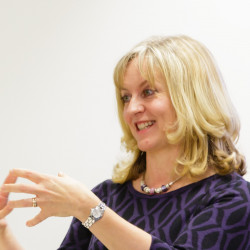Finding the human at the heart of the crisis
 There’s a challenge circulating on social media to count the number of times you say ‘When all this is over …’ before stating how you will enjoy returning to ‘normal’ activities. There will be a moment when the social distancing measures lift and we gather together again, return to offices, visit theatres, go to concerts. But the likelihood is that this moment is much further away than we all imagine. And, some would say, things will never be quite the same again. This may be a good thing.
There’s a challenge circulating on social media to count the number of times you say ‘When all this is over …’ before stating how you will enjoy returning to ‘normal’ activities. There will be a moment when the social distancing measures lift and we gather together again, return to offices, visit theatres, go to concerts. But the likelihood is that this moment is much further away than we all imagine. And, some would say, things will never be quite the same again. This may be a good thing.
Josh Bersin calls it the ‘big reset’ – giving us a moment to step back and re-evaluate what’s important to us and how we may want to reconstruct the way we live and work. I would argue that if we don’t take this opportunity to change how we think, view and interact with the world we live in, we will have missed perhaps the biggest chance we will ever have to change things for the better.
As I write, at this early stage of our period of lockdown, there’s been a flurry of activity from individuals and organisations offering plentiful free resources to interact online, sharing jokes and videos and translating social activities to social media platforms. In fact, it’s been less a flurry and more of an avalanche – a testament to the creative, positive and caring people across the globe who recognise the need to replace physical closeness with something new. But before we all jump at the chance to fill our days with ‘doing’, I would advocate taking the opportunity to slow down, reflect and just ‘be’ for a while. As Aisha Ahmad says in her powerful article in the Chronicle of Higher Education, this is a marathon and not a sprint. We all need time to settle into a new ‘normal’.
So what is this new normal? And what might this all mean for the world of work? Well, my reflections so far are that we have already learned some significant lessons from all this, which we need to take the opportunity to address.
1. Focus on what’s (really) important
If one thing has become very clear over the last few weeks – and will undoubtedly solidify in the weeks and months to come – it is that in our society and businesses, we have been increasingly placing too much value on the wrong things. Most of our work structures and organisations are still driven first and foremost by financial considerations, with community and employee well-being often considerably lower down in terms of priority. Right now, businesses and governments are being forced to consider a range of measures that will help their people to weather the financial storm, which for some is considerable. And there will of course be some painful financial reckonings for businesses to come from all this. But in the meantime, we have all recognised the fundamental need for us to feel physically and psychologically safe, to care for our loved ones and to feel human connection with our family, friends and colleagues. I believe this crisis has given us all a wake-up call about what’s really important, which I hope we take back with us into our organisations and businesses in the future.
2. Do what’s right – all the time
It has been said many times, but it is at moments like these that we see the true measure of our leaders, our organisations and ourselves. The test of whether we rise to the challenge, show humanity and a sense of community – or demonstrate the opposite – is being played out daily and reflected in our news and social media. I sincerely hope we remember the decisions that were taken right now when we are choosing where to spend our money and place our trust in the future. This will also throw a spotlight on those organisations that really do ‘live and breathe’ their values and those for whom they are just fine words on the wall. I hope that in the future the way organisations treat their employees, the wider community and the environment will be the deciding factors in which ones we support. I believe we all need to search our consciences to decide which organisations we continue to support when we return to some sort of normality.
3. Value the front line
In many ways, the virus is a great leveller – we are all susceptible to it, all within its reach. But it has also starkly demonstrated that in tough times the people we rely on are typically those paid less, treated less well and, on an everyday basis, taken more for granted. We need to learn to really value our frontline workers – not just with empty words, but by rewarding them fairly, treating them respectfully and recognising that they are our key workers all the time, not just in times of crisis. In this context, we need to think differently about the role of leaders. Those in leadership roles are there not just to enable their workers to be able to perform their frontline roles to the best of their ability but to implement their duty of care for those reporting to them. Fundamentally, it’s about seeing them as people, not as cogs in a corporate machine.
4. Be a human leader
We have been talking about authentic leadership for years. In theory, this is about being your true self in order to develop trusting relationships. In reality, I believe for most it was always performative – the socially acceptable face of how we feel we ‘should’ be in order to keep our team engaged and performing well. In the face of a real threat to our way of working – and living – we realise that it’s a human leader we need, one that values very different things: humility, patience, compassion. And if that is true in times of crisis, it should also be true the rest of the time. It’s about valuing people and treating them with respect – not because that will help them be more productive or engaged, but because it’s the right thing to do. And if this is true of leaders, it is also true of organisations. We need a significant shift in our view of what’s important and what sits at the heart of all our institutions.
5. Communities create connection
The need for human connection has been brought sharply into focus over the last few weeks. Perversely, although we are more physically distanced, I have heard many anecdotes of people feeling more closely connected to work colleagues than ever before. A client talked about their plan for a virtual ‘after-work drinks’ on a Friday – something they had never done in real life. On my daily walk to get exercise, despite the physical distancing, there has been a noticeable increase in people greeting each other with a smile or a wave. From a wider perspective, we are seeing groups and organisations looking ‘up and out’ at the wider issues and demonstrating how to solve problems creatively. This is less about innovation and more about ingenuity and resourcefulness – the F1 team turning its attention to creating respirators, the well-known brand of rum turning over its breweries to make hand sanitiser. Beneath all these examples is the underlying belief that together we can achieve so much more when we focus on our common concerns and needs.
6. Life(and work)can be so much simpler
As our lives in lockdown have been simplified – staying in our houses, daily solitary walks, collecting food weekly – many of us have also gained a fresh perspective on the work we do every day. Some, of course, are frontline workers, delivering essential services, who don’t have that luxury. But for others, there is no choice. The crisis has had a significant impact on the working lives of many, with job losses and business closures, some of whom are now turning to alternative jobs or volunteer work to support those in need in the current crisis. For the rest of us now working from home, it has helped crystallise what is the really important work and what is just peripheral ‘noise’. Removing the irrelevant ‘busyness’ that has increasingly filled all our working lives, this situation has exposed the heart of what we need to focus on. For some, that may mean returning to a stronger sense of purpose and reducing or removing extraneous activities. Others have seen opportunities to adapt to the situation and be ‘of value’ through the current crisis. Either way, I believe there will be many benefits that we can take with us from our experience of this cleaner, simpler approach to our working lives.
There is, of course, much more to come over the next few months – challenges to be faced, turbulence to navigate and further lessons to be learned. When we look ahead, the future looks uncertain, but one thing is for sure: we will be in a very different place than where we started. So I would suggest we all start to record how we feel, what we discover and how we want things to be different, so that when we are operating in the ‘new normal’, we bring with us a stronger sense of what’s important and, especially, a more human – and humane – approach to help reconstruct a better world.
